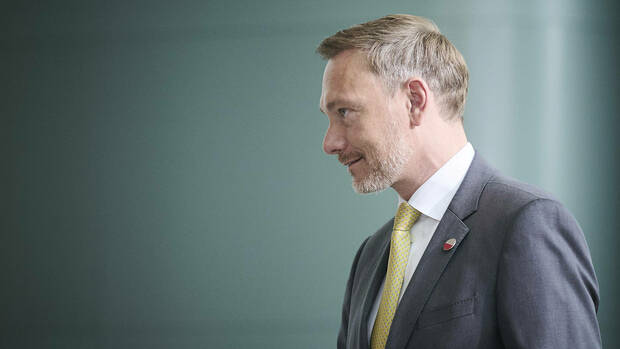A verdict is not expected for a few weeks. But one thing is clear: Should the judges declare the corresponding supplementary budget unconstitutional, that would be financially and politically immense damage for the traffic light coalition. The Handelsblatt answers the most important questions about the procedure.
It was already clear to the SPD, Greens and FDP during the coalition negotiations that it would be difficult for them to finance their many wishes. Therefore, they agreed on a budget trick, which Lindner implemented as finance minister. With a supplementary budget for 2021, he shifted unused corona emergency loans totaling 60 billion euros to the KTF, which was still called the “Energy and Climate Fund” at the time.
The reasoning behind this was the following: Because of the pandemic and the expensive state aid programs, the federal government suspended the debt brake in 2020 and 2021. That allowed her to take out many more loans at record levels.
>> Read here: 20 billion gap: traffic light ministers do not want to accept savings targets – now the chancellor intervenes
However, since 2021 went better economically than expected, the government did not need all of the planned emergency loans. It was already clear during the coalition negotiations that around 60 billion euros would not be called up. Instead of allowing these credit authorizations to lapse, Lindner shifted them to the climate fund in order to be able to use them to finance investments in the years that followed – when the debt brake takes effect again and the budgetary leeway decreases.
What are the critics saying?
The Union faction, on the other hand, complained to the Federal Constitutional Court. She sees a violation of the debt brake.
The CDU and CSU are not alone in their criticism. The Federal Court of Auditors also considers the traffic light budgetary trick to be “constitutionally dubious. “The constitutional ban on the formation of special funds with their own credit authorization is being overturned by taking advantage of inflated emergency loans,” says a statement written by the Court of Auditors for the budget committee.
Law professors also expressed doubts in a committee hearing. Like other lawyers, Christoph Gröpl from Saarland University points out that the debt brake was suspended due to the pandemic, but that the credit authorizations are now being used for other things. The loans “should have to be used directly and promptly to deal with emergencies,” wrote Kyrill-Alexander Schwarz from the University of Würzburg in his statement.
>> Read here: “Unconstitutional” – How economists and lawyers argue about Lindner’s supplementary budget
How does the traffic light coalition defend itself?
The traffic light indicates that the grand coalition has already resorted to the trick. The then Finance Minister and current Chancellor Olaf Scholz (SPD) parked 26 billion euros in unused corona credits in the climate fund – with the consent of the Union.
In addition, the federal government has tried to invalidate legal points of attack as far as possible. She argues that the investments from the climate fund would serve to cushion the economic consequences of the corona crisis in the coming years. “Fiscal policy must therefore continue to make its contribution to alleviating the social and economic consequences of the pandemic,” says the supplementary budget. “In this context, public investments and the promotion of private investments, which promote the necessary transformation to a climate-neutral economy, make a significant contribution.”
In addition, the budget politicians of the traffic light have determined what the 60 billion euros may be used for. This is intended to counteract the impression that reserves are generally being built up for the coming years. “The 60 billion euros have five clearly defined purposes, ranging from measures for energy efficiency and CO2-neutral mobility to the abolition of the EEG surcharge,” says the deputy FDP parliamentary group leader Christoph Meyer. “In this way, the danger of an economic Long Covid should be averted and private sector investment activity should be stimulated.”
What do economists say?
While many lawyers criticize the traffic light budget trick, economists show much more understanding. You see the reserve in the climate fund as an opportunity to soften the transition from the exceptional situation with record debts to the debt brake taking effect.
Corona was a macroeconomic shock that hit all sectors of the economy, says Düsseldorf economist Jens Südekum. “This is reflected in the massive drop in corporate investment as an indirect consequence of the pandemic.” This is where the KTF comes in, government spending stabilizes private investment and thus alleviates the consequences of the corona recession. “Even if the focus is now – reasonably – on climate investments, there is a clear connection to the corona crisis,” says Südekum.
What are the consequences of the judgement?
Should the judges come to the conclusion that the traffic light violated the debt brake enshrined in the Basic Law, the government would face a major problem. Lindner is already finding it difficult to draw up a draft budget for the coming year. The ministries led by the Greens have so far not wanted to accept the finance minister’s savings targets.
If the 60 billion euros from the KTF were to be dropped, it would be even more difficult for the traffic light. For example, help for citizens in converting gas and oil heating systems is to be financed from the fund. The almost ten billion euros in subsidies for the new plant of the chip manufacturer Intel in Magdeburg should come from the pot.
In addition to the financial damage, there would also be a political damage for the traffic light. Above all, the Union would accuse Finance Minister Lindner of pursuing dubious budgetary policies.
More: Economy criticizes the federal government’s focus on subsidies
